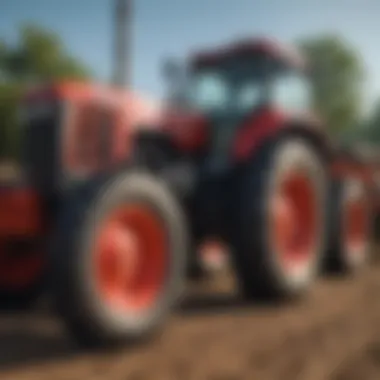Exploring Blanchard Tractors: Functions and Impact


Intro
When examining the landscape of modern agriculture, versatile machinery often takes center stage. Among these machines, Blanchard tractors emerge as significant contributors to enhancing productivity and sustainable farming practices. Their multifaceted functions and technical innovations cater to diverse agricultural needs, ensuring they remain relevant in a rapidly evolving industry.
Understanding the impact of these tractors involves looking at their historical context, technical specifications, and future prospects. Their ability to adapt to changing agricultural demands highlights the importance of exploring them in depth.
Topic Overview
Definition and Importance
Blanchard tractors serve as essential tools for farmers, enabling efficient operations across a range of tasks. From plowing fields to harvesting crops, their design integrates functionality and power. The importance of Blanchard tractors lies in their capacity to boost agricultural productivity and contribute to sustainable practices.
Brief History and Evolution
The journey of Blanchard tractors traces back to early agricultural mechanization. Initially developed to reduce manual labor, these tractors have evolved significantly over the decades. The introduction of advanced technologies and sustainable features has repositioned them as critical players in promoting efficient farming. As agricultural practices shifted towards sustainability, Blanchard tractors adapted. Presently, they embody not just mechanical efficiency but also a commitment to eco-friendly practices.
Key Techniques and Innovations
Sustainable Farming Practices
Blanchard tractors incorporate various sustainable techniques, such as no-till farming, which helps maintain soil health. This method reduces soil erosion and enhances moisture retention. Furthermore, their design often allows for compatibility with precision farming tools, promoting efficient resource usage. By enabling farmers to apply inputs more accurately, these tractors support both productivity and environmental stewardship.
Advanced Agronomic Technologies
Recent advancements in agronomic technologies have transformed how Blanchard tractors operate. The integration of GPS systems provides farmers with precision in land management. This technology allows for better tracking of field conditions and optimal usage of inputs. Additionally, the incorporation of data analytics assists farmers in making informed decisions, ultimately enhancing crop yields and efficiency.
Practical Applications
Step-by-Step Guides
Using a Blanchard tractor effectively requires an understanding of its operational features. Here are some steps to maximize its utility:
- Familiarize Yourself with the Controls: Before operating, spend time understanding the layout of controls and their functions.
- Conduct Regular Maintenance: Ensure that the tractor is in good working condition. Regular checks on oil levels, tire pressure, and hydraulic fluid are crucial.
- Utilize Appropriate Implements: Attach the right tools for specific tasks—plows for tilling, seeders for planting, etc.
Case Studies or Real-World Examples
Practical applications of Blanchard tractors can be seen in various agricultural settings. One notable case is a mid-sized farm that adopted Blanchard tractors for their planting season. By using precision farming methods and the tractor's adaptability, the farm observed a 20% increase in overall crop yields. This example demonstrates the practical benefits that come from integrating these tractors into modern agricultural practices.
"By utilizing advanced technology, Blanchard tractors not only improve productivity but also help in achieving sustainable agricultural goals."
Prologue to Blanchard Tractor
Understanding Blanchard Tractors is crucial for those engaged in modern agriculture. These machines do not merely represent a mode of transportation; they are vital for enhancing productivity and efficiency in farming practices. The introduction of Blanchard Tractors into the agricultural sector has transformed how farmers operate, streamlining tasks and improving yield quality. This section will discuss the historical journey and significance of these tractors, laying the groundwork for the deeper technical insights and operational benefits to come.
Historical Overview
Blanchard Tractors trace their origins back several decades, emerging from a need for efficient agricultural equipment. Initially, farming relied heavily on manual labor and simple tools. As populations grew and food demand increased, the limitations of traditional farming methods became apparent. This demand led to innovations in farm machinery, with Blanchard being at the forefront of this evolution. The company has a reputation for integrating advanced engineering with practical agricultural needs.
Over the years, Blanchard Tractors have adapted to meet changing agricultural practices. Their design incorporates feedback from farmers, ensuring functionality and reliability. Significant advancements include improved engine performance and enhanced fuel efficiency. The evolution reflects a continuous commitment to fulfilling the requirements of modern agriculture.
Importance in Agriculture
The role of Blanchard Tractors in agriculture cannot be overstated. They provide essential functions that traditional methods simply cannot match. Some key points include:


- Enhanced Productivity: Blanchard Tractors allow farmers to complete tasks swiftly, from plowing fields to harvesting crops, significantly increasing output.
- Versatility: These tractors can be equipped with various implements, making them suitable for diverse agricultural activities. This versatility helps farmers adapt to different crop types and farming practices.
- Cost-Effectiveness: While the initial investment may be substantial, the long-term savings in time and labor make Blanchard Tractors economically viable.
The relevance of Blanchard Tractors extends beyond mere productivity. They contribute to the modernization of agriculture, enabling farmers to achieve efficiency and sustainability. As farmers face environmental challenges and fluctuating markets, understanding and utilizing these machines is vital for maintaining competitiveness in the agricultural sector.
Technical Specifications
Understanding the technical specifications of Blanchard tractors is pivotal for farmers and agricultural enthusiasts. These specifications outline the capabilities and the performance efficiencies of the tractors. Each specification serves as a guide for potential buyers, helping them comprehend what they can expect from these robust machines.
Engine Performance
Engine performance is a core attribute of any tractor, directly influencing its operational capacity and productivity. Blanchard tractors are equipped with powerful engines that offer high torque at low speeds. This characteristic ensures that they can handle heavy loads effectively, making them suitable for various farming tasks, from plowing to hauling grain.
The engines typically feature advanced fuel injection systems that enhance fuel efficiency and reduce emissions. Better fuel efficiency translates into lower operational costs, which is a critical concern for farmers. Additionally, the reliability of the engine ensures less downtime, maximizing the time spent on actual farming activities.
"Engine performance in tractors such as Blanchard is not just about power; it's also about providing efficiency and reliability in demanding agricultural environments."
Transmission and Powertrain
Transmission and powertrain systems determine how the engine's power reaches the wheels of the tractor. In Blanchard tractors, these systems are designed for optimal performance across different terrains. The transmissions are often geared to provide a range of speeds, ensuring that the operator can select the most suitable speed for various tasks.
An efficient powertrain minimizes energy loss, transferring maximum power to the wheels. This is particularly important when facing challenging conditions like steep inclines or heavy loads. Additionally, some models feature advanced hydrostatic transmissions, which allow for smooth, variable speed control — an essential characteristic for precision farming applications.
Hydraulic Systems
Hydraulic systems are integral to the operation of Blanchard tractors, enabling the use of a variety of attachments such as plows, seeders, and loaders. The strength and efficiency of the hydraulic system can significantly affect the performance of these attachments, allowing for better control and maneuverability during operations.
Blanchard tractors often feature advanced hydraulic systems that provide quick response times and increased lifting capacity. This capability makes them versatile machines that can adapt to different farming needs, enhancing overall operational productivity. Maintenance of the hydraulic systems is relatively straightforward, ensuring longevity and minimal interruption in service.
Models of Blanchard Tractors
The models of Blanchard tractors play a vital role in understanding the machine’s capability and functionality within modern agriculture. Each model is designed to meet specific farm requirements, catering to diverse operations. Farmers should carefully consider these models to select the best fit for their unique agricultural practices. The importance of Blanchard tractor models lies in their tailored design to enhance efficiency, productivity, and overall farming effectiveness.
Standard Models
Standard models of Blanchard tractors are primarily engineered for general farming. These models prioritize reliability and ease of use. They are equipped with features suited for typical tasks such as tilling, planting, and harvesting. Many standard models offer a wide range of horsepower options, which allows farmers to choose based on their field sizes and crop types.
Farmers find these standard models versatile, providing essential capabilities without unnecessary complexity. Some characteristics include:
- Simplicity in Operation: Streamlined controls suitable for users of all experience levels.
- Durability: Built with robust materials to withstand tough farming conditions.
- Affordability: Generally, standard models present a more cost-effective choice, making them accessible for larger groups of farmers.
Considering these attributes helps farmers maximize their operational efficiency while minimizing equipment costs.
Specialized Models
Specialized models of Blanchard tractors focus on specific agricultural tasks. Whether it is for vineyard management, orchard work, or advanced tillage techniques, these models are built to excel in their designated fields. Specialized models come with unique features that enhance their performance.
Features common in specialized models include:
- Compact Size: Ideal for navigating narrow spaces like grape vineyards or orchards.
- Precision Farming Tools: Equipped with advanced technology such as GPS for accurate planting and harvesting.
- Customized Implement Options: Tailored attachments for diverse farming tasks, ensuring enhanced productivity.
Farmers investing in specialized models often gain a considerable edge in their operations, thanks to the innovative designs which cater specifically to their needs. Blanchard tractors' focus on specialization also ensures that farmers can operate efficiently and effectively within their specific agricultural niches.
"Understanding model variations empowers farmers to select machinery that best aligns with their operational goals and challenges."
In summary, the models of Blanchard tractors reflect a focused approach to agricultural machinery, enabling farmers to productive and meet their unique challenges.


Operational Benefits
Blanchard tractors stand out in modern agriculture due to the operational benefits they offer. Each function of these machines values efficiency and versatility and provides significant cost savings. In examining these benefits, one gains insight into why Blanchard tractors are a preferred choice for many farmers today.
Efficiency in Farming Operations
One of the primary benefits of Blanchard tractors is their efficiency in farming operations. These machines are designed with powerful engines that deliver optimal performance across various tasks. Furthermore, advanced technologies incorporated in their design, such as precision farming tools, enhance productivity. Farmers can complete land preparation, planting, and harvesting in less time and with greater accuracy.
Additionally, Blanchard tractors are engineered to minimize downtime. Features like easy maintenance access and rapid repair capabilities mean that farmers spend less time in the workshop and more time in the fields. The result is a significant boost in overall productivity, ensuring that operations run smoothly without prolonged interruptions.
Versatility Across Different Tasks
Versatility is another hallmark of Blanchard tractors. These machines can easily adapt to different tasks, making them highly valuable in diverse agricultural settings. Blanchard tractors can be equipped with various implements such as plows, seeders, and mowers. This flexibility allows farmers to perform multiple functions with a single machine, which reduces the need for specialized equipment.
As a result, farmers can respond to changing agricultural demands swiftly. Whether it is tilling soil or transporting goods, Blanchard tractors show efficiency in a variety of applications. This adaptability is important in today’s fast-paced farming environment, where the ability to switch tasks can be the difference between success and failure.
Cost-Effectiveness
Cost-effectiveness is critical for farmers managing tight budgets. Blanchard tractors provide considerable long-term savings through their reliability and durability. The initial investment in these tractors is often justified by their low operational costs. With reduced fuel consumption and lower maintenance needs, farmers can achieve more while spending less.
Moreover, the increase in yield due to efficient operations translates to higher profitability. The combination of reduced expenses and enhanced productivity reinforces the economic advantages for users. Farmers know that investing in a Blanchard tractor is not just purchasing a machine but rather investing in their farm's future.
"Investing in Blanchard tractors is investing in efficiency, versatility, and long-term profitability."
Sustainability and Environmental Impact
Sustainability in agriculture is becoming increasingly important due to growing environmental concerns. This section will explore how Blanchard tractors contribute positively to sustainable farming practices. Their role is vital in minimizing the ecological footprint of farming operations. By focusing on efficient fuel use, the prevention of soil compaction, and compatibility with organic farming techniques, Blanchard tractors demonstrate a commitment to better agricultural methods that favor long-term environmental health.
Fuel Efficiency
Fuel efficiency is a critical factor in modern agriculture. Blanchard tractors are designed to optimize fuel consumption through advanced engineering and technology. Efficient fuel use translates directly into cost savings for farmers. Additionally, lower fuel consumption results in reduced greenhouse gas emissions, making these tractors an eco-friendly choice. By adopting vehicles that emphasize fuel efficiency, farmers can improve their profit margins while simultaneously supporting environmental sustainability.
Reduced Soil Compaction
One important aspect of sustainable farming is the preservation of healthy soil. Heavy machinery can lead to soil compaction, which negatively impacts soil health and crop yields. Blanchard tractors are engineered to minimize compaction, thanks to their design and appropriate weight distribution. Lighter models or those equipped with wider tires can significantly limit the pressure exerted on the soil. This prevents degradation of the soil structure, allowing for better water infiltration and improving soil aeration. As a result, crops can thrive more effectively in such conditions, making Blanchard tractors an excellent choice for environmentally conscious farmers.
Integration with Organic Practices
The integration of Blanchard tractors into organic farming systems represents a shift towards more sustainable practices. These machines can be equipped with various tools that support organic methodologies. For example, special attachments are available for plowing and tilling that reduce the need for synthetic fertilizers. Moreover, their versatility allows them to perform multiple tasks within the organic farming cycle, whether preparing the land or assisting in harvest. This compatibility helps organic farmers adhere to strict guidelines while maintaining productivity. By promoting organic practices, Blanchard tractors enhance their role in sustainable agriculture.
Maintenance and Care
Maintenance and care are critical components for ensuring the longevity and efficiency of Blanchard tractors. Proper maintenance can directly influence the performance of the machinery while reducing the likelihood of costly repairs. This section discusses routine maintenance practices, the significance of timely care, and common issues that may arise with these tractors, as well as their solutions.
Routine Maintenance Practices
Routine maintenance encompasses a variety of tasks designed to keep Blanchard tractors operating at peak performance. Here are some essential practices:
- Regular Oil Changes: Frequent oil changes are vital. This helps in reducing wear on the engine. Typically, changing oil every 100 hours of operation is recommended. Also, use high-quality oil to extend engine life.
- Air Filter Inspection: Inspect the air filter every couple of months. A clogged filter can reduce the engine’s performance and fuel efficiency. Cleaning or replacing the air filter regularly is crucial, especially in dusty environments.
- Tire Maintenance: Checking tire pressure and tread depth is essential for maintaining traction and ensuring safety. Incorrect tire pressure can lead to uneven wear and poor handling.
- Battery Care: Regularly examine the battery terminals for corrosion. Cleaning the terminals and ensuring a proper charge maintains the efficiency of the tractor's electrical system.
- Hydraulic Fluid Checks: Hydraulic systems perform critical functions. Inspect the hydraulic fluids for leaks and replace them per the manufacturer’s recommendations.
Maintaining a schedule for these tasks is beneficial. Keeping records of maintenance activities can help in identifying patterns that might indicate severe issues.
Common Issues and Solutions
Even with diligent care, issues may arise. It is important to be prepared and know how to address them. Here are some common problems with Blanchard tractors and their solutions:


- Engine Overheating: This often results from low coolant levels or a malfunctioning cooling system. Regularly check coolant levels and ensure there are no leaks. If the problem persists, it might require a visit to a technician.
- Fuel Injector Problems: Poor fuel quality can lead to injector blockage. It is advisable to use clean, high-quality fuel and consider a fuel additive for cleaner fuel flow.
- Transmission Slipping: This may occur due to low fluid levels or contamination. Check the transmission fluid regularly and change it according to guidelines.
- Electrical Failures: Issues with starting can often be attributed to battery failure or poor connections. Routine battery checks can help prevent this. Also, ensure that all wiring is intact.
These solutions enhance the efficiency of Blanchard tractors. Regular attention to maintenance helps to minimize downtime and maximize productivity in agricultural operations.
"An ounce of prevention is worth a pound of cure."
Engaging in proper maintenance and being aware of common issues is critical for optimizing the performance and extending the lifespan of Blanchard tractors.
Future Innovations
Future innovations in agriculture, particularly concerning Blanchard tractors, are vital for sustaining the industry's progress. As agriculture faces mounting pressures from climate change and an ever-increasing global population, these innovations foster improvements in efficiency, productivity, and sustainability. Exploring this topic reveals the transformative potential of technology and how it can shape farming practices.
Technological Advancements
Technological advancements are at the forefront of innovation in Blanchard tractors. The integration of AI and machine learning capabilities enables these machines to optimize their performance. For instance, advanced sensors allow for real-time monitoring of engine performance and soil conditions. This data lets farmers make informed decisions on when to plant and how to operate their tractors for maximum efficiency.
Moreover, precision farming technologies are enhancing resource management. GPS technology can guide tractors with pin-point accuracy, reducing waste of fertilizer and water. This directly impacts productivity by allowing farmers to target specific areas that require attention, reducing costs in the long run.
Benefits of Technological Advancements:
- Increased Efficiency: Improved accuracy reduces time spent on tasks.
- Cost Savings: Better resource management leads to lower operational costs.
- Enhanced Yield: Optimized actions contribute to higher crop yields.
Smart Farming Integration
Smart farming integration is another key element to explore. As the industry evolves, Blanchard tractors are increasingly embedded within the smart farming ecosystem. This integration offers significant advantages. For example, tractors equipped with IoT (Internet of Things) capabilities can communicate with other smart devices in the field. This interconnectedness allows for coordinated operations across the farm.
Farmers can use mobile applications to monitor their tractors remotely, adjust settings, and receive alerts about maintenance needs. This real-time interaction ensures that farmers can respond quickly to issues, minimizing downtime.
Implementation of smart farming solutions fosters a shift towards data-driven decision-making. By leveraging data analytics, farmers can assess their operations and forecast trends. This capability enables them to adapt more readily to changing agricultural environments.
Key Considerations for Smart Farming:
- Investment: Initial costs can be high but often pay off in efficiency gains.
- Training: Users must be trained to operate sophisticated systems.
- Data Management: Sharing and storage of data should be secure to protect farming operations.
"The future of agriculture depends on our ability to integrate technology with traditional methods, thus creating a more efficient and sustainable farming model."
In summary, the future innovations in Blanchard tractors highlight the industry's drive towards greater efficiency and sustainability. As technological advancements and smart farming integration continue to evolve, the implications for modern agricultural practices become profound. These innovations not only improve productivity but also ensure that farming can meet the challenges posed by a dynamic global environment.
Finale
The conclusion of this article plays a crucial role in encapsulating the overall significance of Blanchard tractors in contemporary agriculture. It provides a final opportunity to reflect on the essential themes discussed throughout the piece. The key elements include the historical context, technical specifications, and their role in sustainability. Each of these aspects interconnects to paint a holistic picture of how these machines enhance agricultural efficiency.
Summary of Key Points
In summarizing the key points, we highlight the following elements:
- Historical Relevance: Blanchard tractors have a rich history that illustrates their evolution alongside agricultural practices.
- Technical Excellence: The tractors boast advanced engineering, with features like powerful engines and efficient hydraulic systems.
- Operational Advantages: They provide significant benefits, including cost-effectiveness and versatility in various farming tasks.
- Sustainable Practices: Their design promotes reduced fuel consumption and lower soil compaction, supporting environmental initiatives.
- Maintenance Considerations: Proper and routine care can prolong the life of these machines, ensuring continued effectiveness.
Overall, these points underscore the foundational elements that make Blanchard tractors a vital asset in the field.
Implications for Future Farming Practices
The implications for future farming practices are profound. As agriculture continues to evolve due to technology and environmental pressures, Blanchard tractors are positioned to maintain relevance. Future innovations and smart farming integrations allow for enhanced productivity and reduced manpower reliance. Key areas to note include:
- Automation Trends: Automated systems can work alongside existing tractor technologies, streamlining farming operations.
- Data Usage: Utilizing data for better decision-making assists farmers in maximizing their resources more effectively.
- Sustainability Focus: Incorporating renewable energy sources will drive further improvements in eco-friendliness.
These directions indicate that the future of farming, with Blanchard tractors as central machinery, will embrace intelligent technologies while prioritizing sustainability and efficiency.
"The integration of innovation in agriculture signifies a transformative shift towards more sustainable practices and greater productivity."
In essence, understanding Blanchard tractors' contributions allows farmers and enthusiasts to appreciate their role in shaping modern agricultural landscapes.



